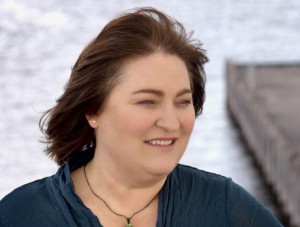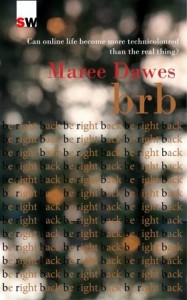 1. What inspired you to write the verse novel, brb: be right back?
1. What inspired you to write the verse novel, brb: be right back?
My usual inspiration is to be immersed in something .. the day.. history…music..art or the environment and write about that in my journal. I write really freely in my journal complete with spelling mistakes. I imagine being other people and write as if I am them or take a particular emotion or response and take it to the max. For example, I expect many parents at home alone with the children have felt lonely – I certainly have at times but I really amplified this situation and feeling in brb – whereas the reality for me was I was quite pleased when the kids were sleeping because I could get on with some writing. When I first started writing brb I was living the chatroom experience – not quite so technicoloured as the boadicea version but it fascinated me from the start and often I would have a couple of chat windows open and be writing away in my journal. The themes of brb continue to interest me – finding real friendship and companionship, feeling connected, notions of fidelity and trust, the reality/nonreality of online life, managing roles and expectations, finding quiet in a busy world and of course the erotic.
2. Tell us about your process. Did you always conceive this as a verse novel? How did you go about putting it together? How different was this from your other writing projects?
I think my process is what would be called organic. In reality it’s start writing, keep writing and hope that something comes of it. My first book was written in the same way. I have to say it’s an alarming way to work because the poems are all very inter-related and often not easy to have published as individual pieces but it’s not at all clear that they will ever come together. Each poem was written as an individual piece and then rewritten many times. At some stage I started getting an idea of what the finished work would be like (verse novel!) and the narrative became more important. To achieve the narrative effect I had several goes at spreading the poems out over the lounge room and putting them in the “right” order. Once I was happy with the order everything had to be checked for continuity. Finally once Spineless Wonders took the manuscript on I had another chance to edit and review with some editorial advice which I have found invaluable. I belong to a writing group and their feedback is excellent motivation to get things just right.
I have had other projects like the embroidery project I did with The Red Room Company where I am clearer about the final product (a suite of poems for their website), but mostly I write and see what happens. One project with dancers ended up with my words being projected across the town hall as the dancers performed. I like to collaborate and try new things and I’ve done quite a few works with visual artists.
3. What advice do you have for writers who are attempting this form?
Phil Salom gave me some advice years ago which has really worked for me and that was to read contemporary writing if that’s what you want to write. I have bookshelves full of poetry collections which have informed and entertained me and I think have improved my writing.
4. Which writers (verse novelists, especially) inspire you?
I can never go past Dorothy Porter in terms of verse novels but my preference for poetry is eclectic… but mainly contemporary Australian. We have such amazing poets here, and a great freedom to use a range of forms. Just on this little patch of the south coast we have Barbara Temperton, Caroline Caddy, Graham Kershaw and Virginia Jealous
5. Tell us what you do if you haven’t written anything in a while and you want to get started writing again? Could you share your favourite writing exercise with our readers?
If I haven’t written anything for a while I get rid of everything off my desk except the pen and paper and maybe a coffee and wait until boredom makes me write. My favourite process, and which is the process behind every poem I have written is to write as regularly as possible in a journal and then go back and find something in the journal that resonates. It might be a line or two or several stanzas. I then get that onto the computer and start playing with structure, metaphor, sound , all those lovely words!
I also find writing in a café helpful (same reason pen, paper , coffee… Write). I like timed writing as an exercise – you just set a timer and keep your hand moving and writing for that amount of time – no matter what it is you’re writing. It doesn’t have to be long – two to ten minutes is good.
Having a regular meeting with my writing group reminds me to get something from the journal and get it to a more finished version.
